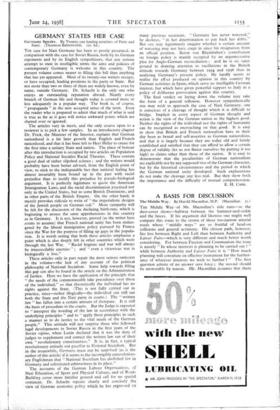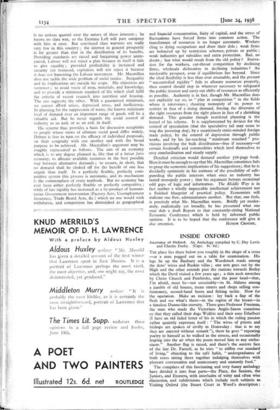A BASIS FOR DISCUSSION
The Middle Way. By Harold Macmillan, M.P. (Macmillan. 5S.) THE Middle Way • of Mr. Macmillan's title runs—so the dust-cover shows—halfway between the hammer-and-sickle and the fasces. If his argument did likewise one might well compare this route to the crown of those too-narrow arterial roads whose " middle ways " are so fruitful of head-on collisions and general acrimony. His chosen path, however, lies less between Right and Left than between Authority and Laisser Faire—which is very different and much better worth considering. For between Fascism and Communism the issue is merely " In whose interests is planning to be carried out ? " while between Authority and Laisser Faire it is " How much planning will constitute an effective instrument for the further- ance of whatever interests we wish to further ? " The first question admits of no answer save force ; the second should be answerable by reason. Mr. Macmillan assumes that there is no serious quarrel over the nature of these interests ; he knows no class war, so the Extreme Left will part company with him at once. But convinced class warriors are really very few in this country ; the interest in general prosperity is far greater than that in the distribution of its benefits. Providing standards are raised and bargaining power unim- paired, Labour will not reject a plan because in itself it fails to give equality ; provided profitability is increased and security not menaced, capitalists will not reject it because it does not hamstring the Labour movement. Mr. Macmillan does not tackle the wide problem of social justice. Inequality and its implications are outside his scope. His objectives are narrower ; to avoid waste of men, materials, and knowledge, and to provide a minimum standard of life which shall fulfil the criteria of recent research into nutrition and housing. The one supports the other. With a guaranteed minimum,. we cannot afford crises, depressed areas, and inefficiency. In planning for the suppression of waste, the known minimum level of demand over an important range of goods will be a valuable aid. But he never regards the social control of industry as an end, or as an evil, in itself.
His scheme thus provides a basis for discussion acceptable to people whose views of ultimate social good differ widely. Debate is free to turn on the efficacy of individual proposals, on their congruity with one another and with the broad purpose to be achieved. Mr. Macmillan's argument may be roughly represented as follows. The aim of an economy which is to any degree planned is, like that of a laisser faire economy, to allocate available resources in the best possible way between alternative demands ; to ensure, .in short, that no demand shall be choked off for the benefit of one less urgent than itself. In a perfectly flexible, perfectly com- petitive system this process is automatic, and its mechanism is the commonplace of every textbook. But no economy has ever been either perfectly flexible or perfectly competitive ; while of late rigidity has increased as a by-product of humani- tarian Government intervention (Factory Acts, Unemployment Insurance, Trade Board Acts, &c.) which no one would wish withdrawn, and competition has diminished as geographical
and financial concentration, fixity of capital, and the stress of fluctuations have forced firms into common action. The transference of resources is no longer automatic. Workers cling to dying occupations and draw their dole ; weak firms are bolstered up by restriction schemes, private or public ; weak industries get subsidies and extra protection. Bad, no doubt ; but what would result from the old policy ? Starva- tion for the workers, cut-throat competition by declining firms, wholesale dislocation in declining industries ? An intolerable prospect, even if equilibrium lies beyond. Since the ideal flexibility is Tess than ever attainable, and the present " uncontrolled rigidity " fails to allocate resources properly, then control should step in wherever necessary to safeguard the public interest and carry out shifts of resources as efficiently as possible. Authority is in fact, though Mr. Macmillan does not explicitly say so, to " play at competition " in the fields where it intervenes ; shearing monopoly of its power to restrict in face of a rising demand, forcing the diversion of the right resources from the right places in face of a shrinking demand. This genuine though restricted planning is the kernel of his scheme. It is supplemented by devices for the control of speculation (that the speculative tail may cease to wag the investing dog), by a suspiciously static-minded foreign trade policy, by the control of depression through public works, and by his far-reaching " minimum standard " pro- visions involving the bulk distribution—free if necessary—of certain foodstuffs 'and commodities which lend themselves to easy standardisation and steady supply.
Detailed criticism would demand another 376-page book. Here it must be enough to say that Mr. Macmillan sometimes fails to grasp the economic implications of his suggestions; that he is decidedly optimistic in his estimate of the possibility of safe- guarding the public interests when once an industry has tasted monopoly power ; that his argument betrays occasional odd gaps of logic and information. The Middle Way is in fact neither a wholly impeccable intellectual achievement nor a finished blueprint of practical policy. Economists will indicate one flaw, administrators another. But that, one feels, is precisely what Mr. Macmillan wants. Boldly yet moder- ately, realistically yet broadly, he has presented what one may dub a draft Report to that constantly-sittilig National Economic Conference which is held by informed public opinion. It is to be hoped that the conference will give it















































 Previous page
Previous page